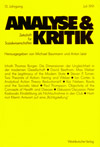ohne Titel

1986 (8) Issue 1
Table of Contents
Title: Das Modell des Homo Sociologicus. Eine Explikation und eine Konfrontierung mit dem utilitaristischen Verhaltensmodell
Author: Karl-Dieter Opp
Page: 1-27
Abstract: The present paper focuses on the sociological model of man (also denoted as homo sociologicus or normative paradigm). It is discussed to what extent three problems limit its explanatory value: (1) behavior which is not normatively regulated and (2) behavior deviating from norms cannot be explained. (3) In case of norm conflicts it cannot be explained which of the normative expectations is followed. It is further discussed to what extent another model of man - which is called the "utilitarian", "economic" or rational choice model - is able to solve these problems. It is shown that the sociological model in fact consists of two different "utilitarian" models with very restrictive assumptions. Some of the problems of the sociological model are demonstrated by applying it to a well-known theory of role conflict. In the final section we discuss some consequences of the sociological model for the utilitarian approach.
Title: Reasons, Causes, and Intentional Explanation
Author: Frederick Stoutland
Page: 28-55
Abstract: The reasons-causes debate concerns whether explanations of human behavior in terms of an agent's reasons presuppose causal laws. This paper considers three approaches to this debate: the covering law model which holds that there are causal laws covering both reasons and behavior, the intentionalist approach which denies any role to causal laws, and Donald Davidson's point of view which denies that causal laws connect reasons and behavior, but holds that reasons and behavior must be covered by physical laws if reasons explanations are to be valid. I defend the intentionalist approach against the two causalist approaches and conclude with reflections on the significance of the debate for the social sciences.
Title: The Talking Cure Cures Talking. Ein Vorschlag, Inauthentizität und Abwehr als Redestörungen zu begreifen
Author: Martin Löw-Beer
Page: 56-85
Abstract: Inauthenticity and the denial to be in certain psychic states (defense) are typical neurotic traits. They both imply processes of mistaken reasoning, that are in the standard case unconscious. Denial of psychic states is accounted for by motivated illegitimate transformations o fpsychic states. The operation of defense mechanisms contradicts rules of correct reasoning. As reasoning takes place in the medium of language, the operation of defense mechanisms contradicts the rules of correct sequencing of utterances. Inauthenticity manifests itself in the incorrect expression of psychic states. The inauthentic person is in the wrong about her psychic states. Therefore her expressive utterances are incorrect. It is shown that the reasons that explain her wrong opinions about. her psychic states and her expressive utterances contradict the concepts of the psychic states she tries to express. The reasons for her expressive utterances are in the standard case unconscious and falsify these utterances. That is why the inauthentic person is partially incompetent to make correct expressive utterances.
Title: Intentional Social Action and We-Intentions
Author: Marvin Belzer
Page: 86-108
Abstract: In his recent book Professor Tuomela presents a philosophical account of social action that relies upon the presuppositions of his purposive-causal theory of individual action. In particular, the concept of "we-intention" plays as central a role in the new theory as does that of intention in the earlier one. This article examines Tuomela's concept of "we-intention". Tuomela's introduction of the concept into social action theory is motivated by the assumption that theories of individual actions and social actions are analogous relative to the role of a concept of intention in those theories. This assumption is criticized; and a number of difficulties with the new concept are discussed.
Title: Wir-Intentionen und die Logik kollektiver Entscheidungen
Author: Julian Nida-Rümelin
Page: 96-108
Abstract: During the last two decades social choice theory has become an established branch of the social sciences. But in spite of its contributions on a high level of precision by logical and mathematical means the theory is still vague regarding the interpretation of its basic concepts. In this article I try to cope with that problem by distinguishing three different areas of application of social choice theory. The concept of 'we-intention' in the sense of Tuomela is examined in this context.